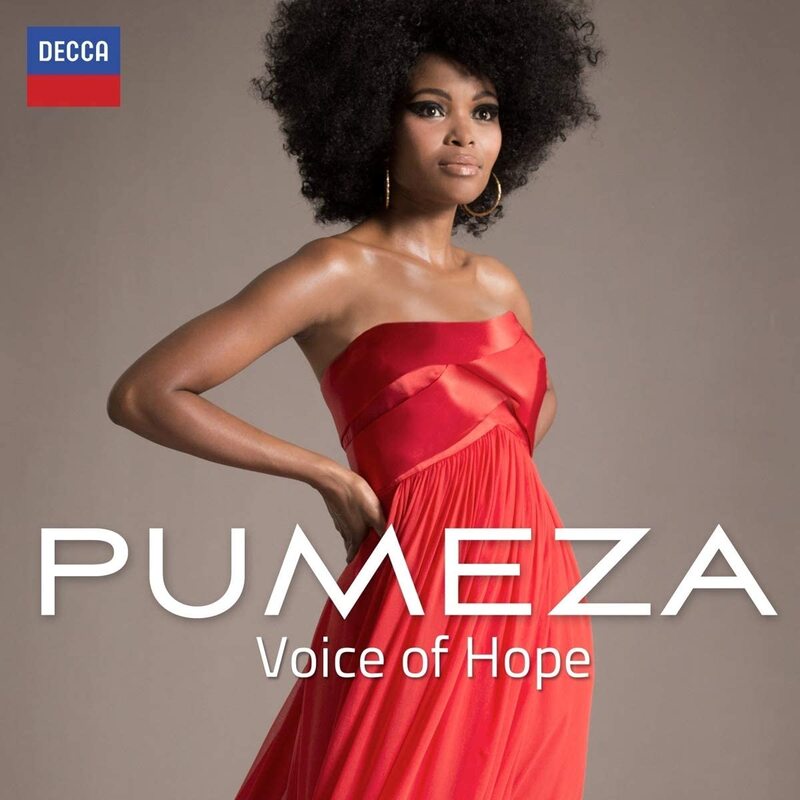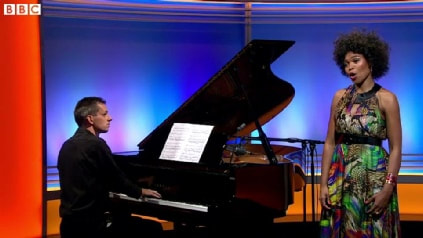|
Pumeza - Voice of Hope
Pumeza Matshikiza, soprano Aurora Orchestra Royal Liverpool Philharmonic Orchestra Iain Farrington, conductor/arranger It was a particular pleasure working with Pumeza Matshikiza on her Decca recording as the arranger and conductor for a number of African songs. These are all songs that Pumeza has known since childhood, and the arrangements had to suit her voice and interpretations, paying homage to African music but with a familiarity to Western ears. Although these songs come from many different genres (traditional, folk, pop) they all shared many underlining features that could be defined as African: a positive rhythmic impulse, an avoidance of sentimentality, clear and simple harmony, accompaniments that are light and energetic. |
|
To capture the spirit of these songs, I listened to hundreds of recordings by the great African performers from the 1950s to the present day, field recordings of tribal songs and dances, as well as some of the successful African-Classical collaborations such as the Kronos Quartet Pieces of Africa and David Fanshawe’s African Sanctus. Many of the songs were favourites of the great African singer Miriam Makeba, who often performed with a small band of guitars and African drums. These songs often used Western instruments, harmonies and tunings as opposed to traditional African tribal music. As a way of maintaining the freshness and immediacy in the arrangements, a small orchestra was used, made up only of strings with African percussion and the occasional use of wind soloists. The outstanding playing of the Aurora Orchestra makes an essential contribution to the sound of the songs, with its brilliant individual players and terrific ensemble.
|
|
|
|
Although not all the recorded songs were featured on the final album, we did record the following:
Bexabene Oxam (Click Song 2) – This is essentially a Xhosa children’s nursery rhyme, a tongue twister full of clicks. With light shakers and a dancing flute above the strings, this is a simple playful version.
Click Song – Made famous by Makeba, this is a Xhosa traditional song that shows off the virtuoso clicking of the singer, with nonsense words. The accompaniment is energetic, percussion-led with the clarinet providing improvisatory commentary.
Holilili – One of South Africa’s leading songwriters, Allan Silinga, composed a number of songs for Makeba that became classics. Holilili is a slow blues that The Skylarks recorded in the 1950s. This version evokes the jazz sound of that period with smoky clarinet, pizzicato bass, and sliding strings.
Iya Guduza – A simple folksong that has a cheery smile, despite the anxiety of the lyrics. Using only a marimba and light percussion, the sound has a real folk quality.
Lakutshon Ilanga – Mackay Davashe was a South African jazz composer and performer who composed this love song, made famous by Makeba in the 1950s. This arrangement takes a broad symphonic view of the song, essentially an evocation of the beautiful natural African landscape at sunset. Distant birds calls are heard in the woodwind, seagulls cry in the strings, and the harmony is still, gently rocking like the sea. Its orchestral scale is in the tradition of Canteloube’s version of Bailero.
Malaika – A Swahili popular song that has been recorded numerous times, although with disputed authorship. The little bird in the song is depicted with a light flute solo, while the marimba carries the rhythmic swaying and clean harmony.
The Naughty Little Flea – Written by the American songwriter Norman Thomas, this novelty song with a calypso quality was popularised by Makeba in the 1950s. The pizzicato strings throughout resemble a group of guitars, comic and playful, with shimmying shakers.
Ntyilo Ntyilo – This song by Allan Silinga was composed for Makeba, and is often heard as a jazz song as she performed it. The lyrics conjure up a nature scene, with a spiritual and religious element not often heard. This arrangement is an impressionistic nature scene recalling the sounds of an evening rainforest: frogs croaking with guiros, crickets chirping in the strings, the shimmering heat in the marimba, while an oboe gives a long sustained call through the wild. A gentle shower of rain is heard at the end as the song fades away.
Pata Pata – One of Makeba’s own songs, and an African pop hit sung in Xhosa. Its strong jazz influence is explored in the harmony and the 8 bar orchestral ‘break’. Cow bells add a metallic, industrial groove to the rhythmic strings.
Rachel’s Blues – Taken from the musical Mkhumbane by Todd Matshikiza with words by Alan Paton, this song is in a jazz ballad tradition. With its late-night nostalgic feel to it, free expressive pulse and piano accompaniment, it belongs to the American jazz song tradition.
Saduva – A song by Mackay Davashe made famous by Makeba, its simplicity and harmonic regularity is offset by a passionate chorus. Scored only for three woodwind, pizzicato bass and percussion, it has a playful outdoor feel. A talking drum gives a new character.
Thula Baba – This simple lullaby in Xhosa is well known as a traditional song, slow and peaceful. By using a Classical sounding ensemble, a link is made to the arias by Puccini on the album.
Bexabene Oxam (Click Song 2) – This is essentially a Xhosa children’s nursery rhyme, a tongue twister full of clicks. With light shakers and a dancing flute above the strings, this is a simple playful version.
Click Song – Made famous by Makeba, this is a Xhosa traditional song that shows off the virtuoso clicking of the singer, with nonsense words. The accompaniment is energetic, percussion-led with the clarinet providing improvisatory commentary.
Holilili – One of South Africa’s leading songwriters, Allan Silinga, composed a number of songs for Makeba that became classics. Holilili is a slow blues that The Skylarks recorded in the 1950s. This version evokes the jazz sound of that period with smoky clarinet, pizzicato bass, and sliding strings.
Iya Guduza – A simple folksong that has a cheery smile, despite the anxiety of the lyrics. Using only a marimba and light percussion, the sound has a real folk quality.
Lakutshon Ilanga – Mackay Davashe was a South African jazz composer and performer who composed this love song, made famous by Makeba in the 1950s. This arrangement takes a broad symphonic view of the song, essentially an evocation of the beautiful natural African landscape at sunset. Distant birds calls are heard in the woodwind, seagulls cry in the strings, and the harmony is still, gently rocking like the sea. Its orchestral scale is in the tradition of Canteloube’s version of Bailero.
Malaika – A Swahili popular song that has been recorded numerous times, although with disputed authorship. The little bird in the song is depicted with a light flute solo, while the marimba carries the rhythmic swaying and clean harmony.
The Naughty Little Flea – Written by the American songwriter Norman Thomas, this novelty song with a calypso quality was popularised by Makeba in the 1950s. The pizzicato strings throughout resemble a group of guitars, comic and playful, with shimmying shakers.
Ntyilo Ntyilo – This song by Allan Silinga was composed for Makeba, and is often heard as a jazz song as she performed it. The lyrics conjure up a nature scene, with a spiritual and religious element not often heard. This arrangement is an impressionistic nature scene recalling the sounds of an evening rainforest: frogs croaking with guiros, crickets chirping in the strings, the shimmering heat in the marimba, while an oboe gives a long sustained call through the wild. A gentle shower of rain is heard at the end as the song fades away.
Pata Pata – One of Makeba’s own songs, and an African pop hit sung in Xhosa. Its strong jazz influence is explored in the harmony and the 8 bar orchestral ‘break’. Cow bells add a metallic, industrial groove to the rhythmic strings.
Rachel’s Blues – Taken from the musical Mkhumbane by Todd Matshikiza with words by Alan Paton, this song is in a jazz ballad tradition. With its late-night nostalgic feel to it, free expressive pulse and piano accompaniment, it belongs to the American jazz song tradition.
Saduva – A song by Mackay Davashe made famous by Makeba, its simplicity and harmonic regularity is offset by a passionate chorus. Scored only for three woodwind, pizzicato bass and percussion, it has a playful outdoor feel. A talking drum gives a new character.
Thula Baba – This simple lullaby in Xhosa is well known as a traditional song, slow and peaceful. By using a Classical sounding ensemble, a link is made to the arias by Puccini on the album.

